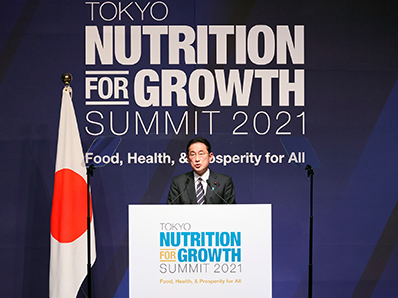ODA Topics 3
Japan’s Efforts for Achieving UHC
—Tokyo Nutrition for Growth Summit 2021—
● The COVID-19 Pandemic and UHC
In response to the global spread of COVID-19, it is important to achieve universal health coverage (UHC), which is based on the concept of “human security,” to “leave no one’s health behind.” This ensures that all people can receive effective and quality health services at an affordable cost.
Based on this approach, Japan has been providing approximately ¥340 billion (approximately $3.1 billion) since immediately after the COVID-19 outbreak, both through bilateral assistance and international organizations. With an additional pledge made in June 2021 to provide $800 million to the COVAX Facility, Japan will extend a total of ¥430 billion (approximately $3.9 billion) of assistance (See Part I regarding Japan’s assistance against COVID-19).
Japan is also working on generating an enabling environment for health security across broader sectors, in addition to enhancing the ability to respond to COVID-19, centered around development and equitable access to vaccines, etc., as well as strengthening health systems to prepare for future health crises.
● Tokyo Nutrition for Growth Summit 2021

Prime Minister Kishida giving a speech (Photo: Cabinet Public Affairs Office of the Government of Japan)
Nutrition is fundamental for supporting UHC. Nutrition improvement is part of Goal 2 of the Sustainable Development Goals (SDGs), and is deeply linked to other 12 goals. It is connected not only to the health sector but also to numerous other sectors, including agriculture, distribution, water and sanitation, and gender, therefore, it is essential to promote nutrition improvement in collaboration with each of these sectors for achieving the SDGs. A swift response is required as malnutrition becomes all the more serious, especially among socially vulnerable people such as children of poor families who cannot receive school meals due to school closures, while COVID-19 has led to a downturn in global socio-economic circumstances.
On December 7 and 8, the Government of Japan hosted the Tokyo Nutrition for Growth Summit*1 2021. At the Summit, participants discussed focusing on five thematic areas: (i) Health, (ii) Food, (iii) Resilience, (iv) Accountability, and (v) Financing, considering the worsened state of nutrition globally due to COVID-19, as well as the issue of the double burden of malnutrition, namely the co-existence of undernutrition that hinders growth and overnutrition that causes lifestyle-related diseases, which are being experienced across both high-income or resource-limited countries.
The Summit was attended by leaders and ministers from approximately 30 countries, heads of international organizations such as UN Secretary-General Guterres, the World Bank President Malpass, and WHO Director-General Tedros, and representatives from civil society organizations, the private sectors, and academia. (The Summit was held in a hybrid format that combines on-site participation of domestic guests and online participation from overseas.) Participants engaged in a broad range of discussions concerning nutrition improvement for people around the world, and deepened their common understanding of the direction of future actions. Over 390 commitments (expressions of political and financial intent) from numerous stakeholders were submitted, and the Tokyo Compact on Global Nutrition for Growth was issued as an outcome document, indicating the direction for the international society to improve nutrition.
From Japan, Prime Minister Kishida delivered an opening speech, and Foreign Minister Hayashi made a welcoming speech. In his speech, Prime Minister Kishida announced that Japan will provide nutrition-related assistance to the world, which will amount to over ¥300 billion, over the next three years. Foreign Minister Hayashi pointed out all stakeholders, including governments of both high-income and resource-limited nations, private sector entities, civil society, and academia, need to be united in addressing this important issue, and that each of us needs to steadily fulfill the commitments we have made.
Japan will make continuous efforts to provide such support to achieve UHC.
*1 The London Olympic and Paralympic Games took place in 2012. Taking the opportunity presented by this international sports festival, the Nutrition for Growth Summit was held for the first time in London in 2013 with the aim of considering the issue of nutrition on a global scale. Japan held the Nutrition for Growth Summit as the host country of the Tokyo Olympic and Paralympic Games.
